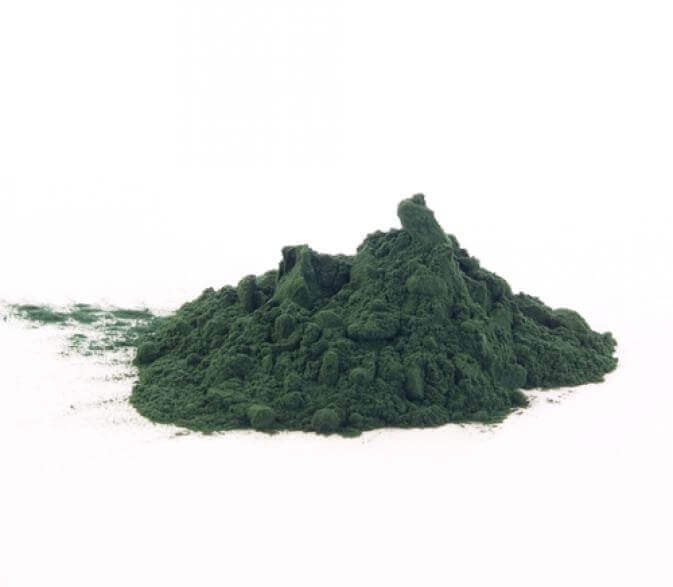What is Spirulina?
Super food or expensive pond scum? Is this “green food” worth the greenbacks? Find out what nutritional benefits spirulina offers.
Monica Reinagel, MS, LD/N, CNS
Listen
What is Spirulina?

Nutrition Diva fan Joanna asks:
“Can you discuss the benefits vs. costs of spirulina powder as a dietary supplement?”
For those who aren’t familiar with it, spirulina is a dark green algae that grows on the surface of lakes. In other words: it’s basically pond scum—but really nutritious pond scum! The ancient Aztecs used to skim spirulina algae off the surface of lakes and dry it into cakes, which served as an important source of nutrients. Today, you’re most likely to find dried spirulina powder in the health food store, where it’s sold as a “green” supplement, or added to smoothies, juices, and other “health” drinks..
What are the Nutritional Benefits of Spirulina?
High Quality Protein. Spirulina is rich in high-quality protein, which can be particularly useful for vegans. Adding an ounce of spirulina powder (which is about 3 tablespoons) to a smoothie, for example, would add a pretty significant amount of protein—around 15 grams, which is what you’d get in two jumbo eggs or a half a serving of chicken breast.
Nutrition. Spirulina also provides various vitamins, minerals, and essential fatty acids. It’s particularly rich in beta-carotene and vitamin K, although if you’re eating a reasonable amount of fruits and vegetables, you’re probably getting plenty of these vitamins already. It’s also high in iron—which may be more useful for vegetarians. Although it does contain several B-vitamins, spirulina is not a reliable source of vitamin B-12. Although the label may show a high level of B-12, studies have shown that the form of B-12 in spirulina is inactive in humans. Vegans should not rely on spirulina as a source of B-12
Other Potential Health Benefits. Studies in test tubes and lab animals suggest that spirulina may boost immune function—although there aren’t any studies that show the same effects in humans, or that compare the effects of spirulina with other similarly nutritious fruits or vegetables. There’s also some evidence that spirulina might promote the growth of beneficial bacteria in the gut. In other words, it appears to be one of those “prebiotics” that I talked about in a recent show.
As for reports that spirulina can reduce allergies, cure cancer, relieve depression, improve memory, or treat heart disease or diabetes, the National Institutes of Health has concluded that there just isn’t enough evidence to recommend spirulina for any specific health condition.
See also: Can You Reverse Diabetes With Diet?
What are the Disadvantages of Spirulina?
Cost. Although spirulina does contain a lot of important nutrients, it’s not cheap. An ounce of spirulina will run you between $1.50 and $3.00. You could get the same nutrients from other sources more cheaply.

Taste. Spirulina isn’t exactly prized for its flavor, which could best be described as…well, algal. Most people enjoy spirulina mixed with other ingredients. Being a pleasure glutton myself, I prefer to get my nutrients from foods I enjoy eating.
Hype. Folks promoting spirulina often make a lot of claims for special super-powers, such as suppressing the appetite, aiding with weight loss, “energizing” or “alkalizing” the body—but these benefits have not been confirmed by any solid research. I’d consider most of it to be marketing hype.
See also: Do pH-Balancing Diets Work?
The Bottom Line on Spirulina
Spirulina is undoubtedly nutritious. It may offer a valuable source of protein, especially for vegans. If you’re viewing it as a sort of vitamin supplement, it’s on the expensive side—and doesn’t provide anything you can’t get from a healthy diet. If cost is no issue and it makes you feel good to add a scoop to your smoothie, it certainly won’t do any harm. But if the food budget is tight, I think your money would be better spent on equally nutritious—but more economical—foods.
See also: Do You Need a Vitamin Supplement?
Keep in Touch
Thanks to Joanna for suggesting today’s topic. If you have a question or suggestion for a future show topic send an email to nutrition@quickanddirtytips.com. You can also post comments and questions below or on my Nutrition Diva Facebook Page. I answer a lot of listener questions in my free weekly newsletter, so if you’ve sent a question my way, be sure you’re signed up to receive that.
Spirulina powder image courtesy of Shutterstock.

